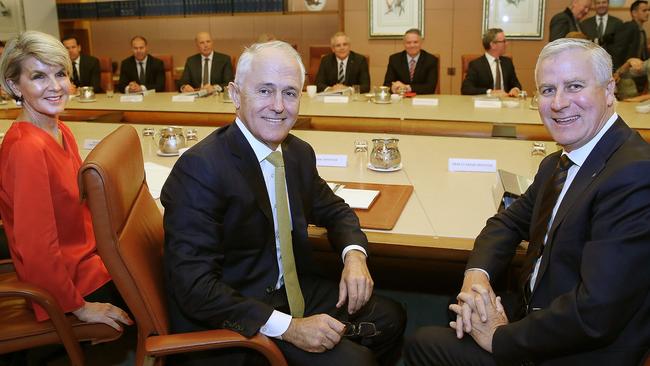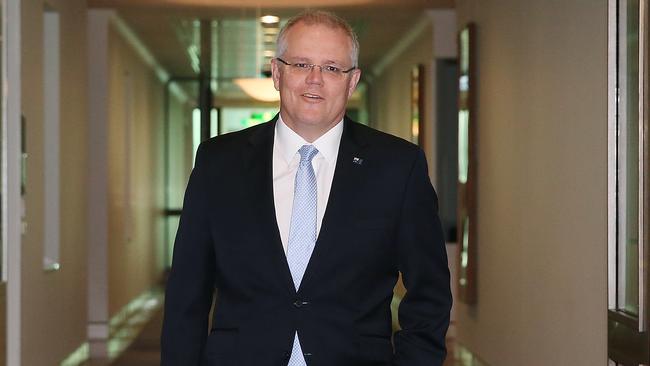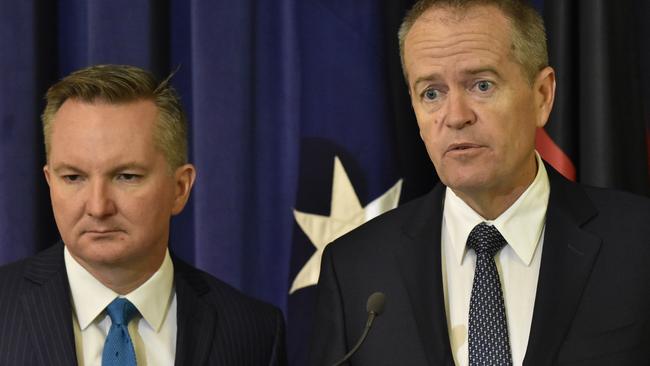Budget 2018: battle for poll position
Treasurer usually has one speed when spruiking economic message, but there’s lots of moving parts in this budget.

Tonight’s budget has been strategically calibrated for an election, expected later this year or more likely early next. To a certain extent the election timing will be dictated by how this budget is received, a window into its political importance to a government struggling in the polls.
But the budget framing requires a deft touch — targeted tax cuts for important voting cohorts coupled with a believable pathway back to surplus.
The balancing act risks pleasing nobody: not fiscal conservatives, who claim the giveaways damage the Coalition’s economic credibility and imperil the national accounts; not sections of the public who consider what’s likely to be on offer as too minuscule to shift their votes after years of divisions and disappointments.
Then we have the tens of billions of dollars’ worth of company tax cuts, which we know will be included in the budget forward estimates. Whether they would help stimulate economic growth has (perhaps unbelievably) become a side point. They appear unlikely to pass the Senate and even business figures are starting to say they represent a distraction from the government’s re-election agenda. In the wake of the banking royal commission scandals, former treasurer Peter Costello also believes they are destined to fail.
And there is no escaping the political context of this year’s budget: set in the midst of continuing internal destabilisation by a small coterie of Tony Abbott supporters who are complaining about everything from energy policy to Malcolm Turnbull’s capacity to sell a message.

Such criticisms circulate around the echo chamber of night-time pay-TV, occasionally making their way into the mainstream as well.
Team Turnbull hopes the budget handed down tonight will help the government build much needed momentum in the second half of this year to overcome instability and poor polls, which continue to feed commentators’ speculation about what may happen come the twin killing seasons ahead: the parliamentary week ahead of the winter recess and, more significantly, the final sitting period before the end of the year.
“(It’s) a budget that will ensure hardworking Australians can keep more of the money they earn,” the Prime Minister told cabinet yesterday. “A budget that will enable us to have the resources to keep Australians safe, and a budget that will ensure the government lives within its means.
“Because we don’t want to throw a mountain of debt on to the shoulders of our children and grandchildren.”
However, analysis of past budgets tells us the myth-making around budgets delivering governments a bounce in the polls is exactly that: myth-making. The only Costello budget that delivered a poll bounce was his first, in 1996, and it was the toughest budget he handed down, restricting spending and delineating between core and non-core promises from the campaign. Voters wanted tough medicine and rewarded Costello for doling it out.
Subsequent Costello budgets, many of which included big surpluses and large-scale handouts, immediately were talked up by observers but ultimately didn’t deliver the political windfall hoped for. The only one that arguably did so in conjunction with a series of other issues was the 2001 budget, delivered ahead of a difficult election the Coalition found a way to win with an increased majority.

Turnbull supporters are drawing parallels between 2001 and today, but how genuine are such comparisons? Certainly the 1998 result was similarly as tight for John Howard as the 2016 one was for Turnbull. Turnbull’s majority of one is smaller than Howard’s was, but Howard scraped home with just 48.9 per cent of the two-party vote in 1998. Turnbull at least secured more than 50 per cent two years ago.
While Turnbull has faced persistent internal instability courtesy of a divided party in the wake of his first term leadership challenge to Abbott, Howard endured no such difficulties. And the rise of One Nation was an issue for Howard in 1998. By 2001 it was politically vanquished, partly because of the way the government handled the Tampa refugee crisis.
In contrast, One Nation today looks to be building momentum ahead of the next election rather than losing it, with little the government can do to stop that, without surrendering the all-important centre ground it must win to defeat Labor.
In 2001 economic conditions also were stronger than they are today, and the then Coalition government had runs on the board courtesy of its implementation of the GST it took to the 1998 election. Tonight, no matter how improved the budget bottom line is across the forward estimates, Scott Morrison still will hand down another deficit this coming financial year, with gross debt double what it was when Labor was kicked out of office in 2013.
It is a far cry from what Joe Hockey and Abbott promised in opposition, when voters gambled on the Coalition’s magic pudding promise not to cut services at the same time as balance the books.
In the budget lockup today, journalists will pore over the fine print of what’s in the Treasurer’s second budget, including trying to ascertain the extent of off-budget infrastructure spending. Such largesse is designed to help shore up marginal seats in regional parts of the country, which explains the ill-disciplined remarks of new Nationals leader and Deputy Prime Minister Michael McCormack a few weeks back when he described Morrison as Santa Claus.
McCormack was slapped down publicly by the Treasurer, highlighting the delicacy of handing out largesse while spruiking a message of fiscal discipline. It’s a difficult double act. Infrastructure spending is important, but to be off-budget it must deliver an economic return for the government, otherwise it hits the budget bottom line.
There has been contestation within the cabinet on how to manage the uptick in company taxes trickling into the budget in the post global financial crisis economy. For years companies have been able to avoid paying company taxes as they work their collective way through losses accumulated during the GFC. That is coming to an end, hence the extra money Morrison has to play with. Some, such as Home Affairs Minister Peter Dutton, have argued for more to be set aside for handouts designed to claw back political support. As a former assistant treasurer to Costello, Dutton saw how this used to be done to great political effect come election time.
But Morrison is cognisant of the criticisms he will endure now and into the future if he’s typecast as a treasurer who acts with ill-discipline. Dutton — representing one of the most marginal seats in the government, Dickson, in a state, Queensland, that swings wildly — has more immediate concerns.
So far we know, income tax cuts will be targeted heavily towards lower and middle-income earners. While modest, according to leaked reporting of what will be in the budget, such modesty has been coupled with long-term plans to cut rates further beyond the forward estimates. In opposition, Liberals mocked Julia Gillard’s government for such budgeting around the National Disability Insurance Scheme and education funding, yet they now appear set to do something similar.
Reporting suggests there also will be something in these long-term plans for high-income earners, and bread-and-butter health funding has already seen Health Minister Greg Hunt out and about talking up the government’s credentials in this space. Doing so is easier now than it was during the 2016 election campaign when Labor vexatiously campaigned on the fear that the Coalition planned to abolish Medicare. In contrast, we already know the government has walked away from plans to increase the Medicare levy because of the improved budget bottom line, apparently.
Of course, we also have the usual claim that billions can be saved by clamping down on enforcements, this time surrounding illegal production and distribution of tobacco products. We’ll see in the years ahead if the sums claimed are ever achieved.
There will be surprises in the budget tonight when the Treasurer takes to his feet in parliament, as there always are. But one element of the budget that won’t be a surprise is the continued commitment to company tax cuts.
It’s such a hard sell in the wake of the revelations at the banking royal commission that even the head of the Australian Institute of Company Directors, Elizabeth Proust, says they are “distracting” and “unlikely to succeed”.
This is where Labor will continue to target its attacks on the government. Bill Shorten already has said the next election will be a referendum on the planned company tax cuts, words opposition finance spokesman Jim Chalmers echoed just last week.
The company tax cuts also risk making a mockery of the Treasurer’s pledge to enshrine the maximum tax to gross domestic product take in budgets of the future to 23.9 per cent. How can that be applied practically given the fluctuations that naturally occur in the economy, much less when considering baked-in company tax cuts across the forward estimates that parliament seemingly won’t approve? Chalmers hammered home the point yesterday: “Australians don’t care whether the tax to GDP is 23.9 per cent, they care whether the tax system is fair and they care whether it funds the things as a society truly value.”
Stepping back from the micro wars that will rage over specific budget initiatives and the challenges the company tax cuts pose for the Coalition in the context of the royal commission, Morrison and Turnbull hope this budget will embed a stark contrast between the major parties. Labor via its already announced changes to tax deductions and the like is offering a higher-taxing alternative to what the Coalition in government plans for the future. More spending by Labor, but at the cost of larger government.
These are the traditional battle lines Liberals like to draw with Labor. Does Team Turnbull have the rhetorical skills to win such an argument? Does it matter in the wake of the years of internal instability? And what about polls that suggest voters want greater government spending rather than personal tax cuts? The Treasurer usually has one speed when he spruiks the government’s economic message, but there are a lot of moving parts in this budget. The politicking to follow will require nuance. We’ll soon see if Morrison has what it takes. The sales job starts this evening.
Peter van Onselen is a professor of politics at the University of Western Australia.





